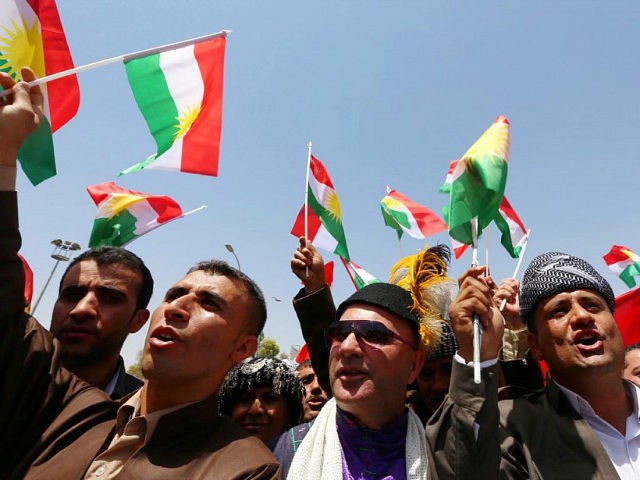Iraqi Prime Minister Haider al-Abadi issued a statement Friday rejecting the call by Kurdistan Regional Government (KRG) President Masoud Barzani for a national independence referendum, declaring that the Kurdish people cannot “decide its fate unilaterally.”
Iraqi News carried the statement by al-Abadi, which followed Barzani’s declaration that the Kurds would hold a referendum vote in September.
“Iraqi relies on the constitution as the reference for shaping the relation between the federal government and Kurdistan region,” the statement, issued by spokesman Saad al-Haditihi, read. “No party can decide its fate unilaterally. … All Iraqis should have their say regarding their homeland’s fate.”
A number of interested government parties have weighed in on the announcement, including the governments of Turkey, Germany, and the United States. The U.S. State Department issued its remarks on the matter on Thursday, warning against the referendum taking place before the ultimate defeat of the Islamic State in Iraq.
A coalition including Kurdish Peshmerga forces, Iran-backed Iraqi Shiite militias, and the Iraqi military are currently fighting to eradicate the Islamic State completely from its final major stronghold in the country of Mosul.
“We support a unified, stable and a federal Iraq. We appreciate and understand the legitimate aspirations of the people of the Iraqi Kurdistan,” State Department spokeswoman Heather Nauert said.
“We … encourage the regional authorities to engage with the government of Iraq on the full range of important issues, including the future of relations between Baghdad and Erbil, on the bases of the Iraqi constitution.”
Nauert added concern that the referendum could damage efforts to address “more urgent priorities” than a free Kurdistan, including the fight against the Islamic State.
American officials have long expressed a belief that Kurdistan would become an independent state in the near future, however.
“Kurdish independence is on a trajectory where it is probably not if, but when,” Marine Lt. Gen. Vincent Stewart, the head of Pentagon intelligence, told the Senate Armed Services Committee last month. “And it will complicate the situation unless there’s an agreement in Baghdad—an agreement that all of the parties can live with.”
The KRG, based in Erbil, cooperates with the United States on anti-Islamist activities and maintains friendly relations with neighbors like Turkey, currently embroiled in a regional conflict with two other Kurdish entities, the Syrian Kurdish People’s Protection Units (YPG) and the Kurdistan Workers’ Party (PKK). The KRG has repeatedly demanded that both the YPG and PKK stay out of KRG territory.
The Turkish government has, nonetheless, loudly opposed the KRG independence referendum, with officials calling the vote a “grave mistake.” Prime Minister Binali Yıldırım personally referred to the vote as “irresponsible.” The Kurdish outlet Rudaw quotes a Patriotic Union of Kurdistan (PUK) member saying that Turkish officials also privately “threatened” Iraqi Kurds who sought to organize the referendum.
Barzani announced through a Twitter statement on Wednesday that the referendum would take place on September 25. The presidential office also released an official announcement confirming that the KRG leadership had “decided that the date for the independence referendum shall be Monday, September 25, 2017. It will be on that day when the people of the Kurdistan Region, as well as those living in the disputed areas, will cast their votes on whether they accept independence for the Kurdistan.”
The announcement triggered mass exclamations of support from Kurds on social media, according to Kurdistan24, which notes that “Kurds are believed to be the largest stateless nation in the world, estimated to be over 40 million.” Many added the Kurdish flag to their profile photos and expressed support for Barzani. Opinion polls among Kurds also corroborate the strong support for independence that appeared online.
We crossed the Rubicon with that decision, there is no going back,” KRG senior adviser Hoshiyar Zebari told Reuters Thursday. “A referendum is a democratic process, no democratic country can oppose having a referendum; we are not talking about independence, we are talking about the referendum.”
The Kurdish outlet BasNews reports that non-Shiite Arab Iraqis also appear supportive of the move, with a Turkmen political leader expressing support for the “significant” measure, and a Yazidi leader stating, “Kurdish Yezidis support referendum and independence of Kurdistan Region.”

COMMENTS
Please let us know if you're having issues with commenting.